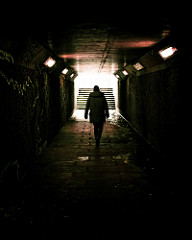You have no items in your cart. Want to get some nice things?
Go shopping Neeta pulled her case along the uneven pavement, umbrella angled against the driving rain, and headed towards the underpass. She didn’t usually go home that way. A friend of hers had been mugged coming through there a few years ago, and it felt a quite sinister place anyway, but she was tired after the long journey and her case was heavy.
Neeta pulled her case along the uneven pavement, umbrella angled against the driving rain, and headed towards the underpass. She didn’t usually go home that way. A friend of hers had been mugged coming through there a few years ago, and it felt a quite sinister place anyway, but she was tired after the long journey and her case was heavy.
The roundabout the underpass traversed was huge. It filtered several roads from the north into the city centre. Neeta tried to put some energy into pulling her case. She was dog tired, worse than when she’d just come off nights on the ward. Mauritius had been great, though. It was years since she’d had enough money to go back to see her mum’s sisters and her cousins. But it would be so good to be home now, to close her front door and open her arms to Steve and the kids. Back to reality, back to the UK; and to one of those grey, heavy-clouded days London has to offer in late autumn. She noticed her feet were getting wet through her shoes.
She was about halfway down the slope towards the underpass when she saw a man emerge from the tunnel and head towards her. She instinctively felt anxious and glanced at him, weighing up the possible danger: first impression was of a young man medium height, stocky build, wearing sneakers, jeans and a sweat top. He looked okay, no obvious signs to cause alarm. She decided to carry on towards the entrance to the tunnel. The young man slowed down as he came up to her.
‘Excuse me.’
She felt an adrenaline rush through her tiredness. But he didn’t seem to be spaced out or drunk. She knew the symptoms well from work. She increased her speed, keeping her case at arm’s length, so it didn’t hit her ankles as she went downhill.
‘Excuse me,’ he said again.
He was trying to catch her eye. They were within a few feet of each other. He held out his hand. She framed the word ‘sorry’; and then she was past. He must have some problem, though he didn’t look down and out and needing money. As she turned towards the tunnel, she felt the back of her neck prickle, worried that he might not think sorry was enough.
She was relieved to see a woman with a small girl on pink bicycle come out of the tunnel. The woman was wet through and pulled the bike roughly by its handlebars. The little girl was crying. As she got to Neeta, the woman said:
‘Don’t go down – blocked – I got soaked coming through. With all this rain we’ve had, there’s a right flood there.’
As she spoke, realisation struck Neeta. She’d got it wrong about the young man earlier. He’d been trying to warn her about the water in the tunnel. She turned back, lugging her case, which seemed heavier than ever with all the presents from the aunties, and, as she emerged at the top of the underpass, she saw the boy was just about to go down the next section, on the other side of the road. She raised her arm in a gesture of acknowledgement and apology. She saw from the angle of his head, and the way his jaw jutted out, he was angry. A lorry blocked him from view and, when it had passed, he was gone. She had been caught out, having wrong assumptions: her, of all people; because she had had her share of that over the years. She felt bad, but it was too late to undo what she’d done. Standing at the pedestrian crossing, waiting for the lights to change, Neeta shook the rain off her umbrella. Would she be glad to get home.
About Janet Laugharne
Janet Laugharne lives in Wales, UK, and is currently working on a short story collection. She is an experienced writer of non-fiction.




